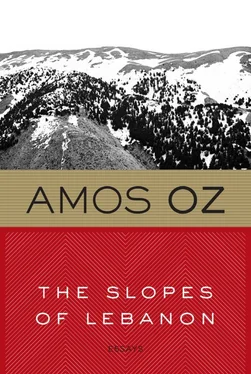A giggle rippled through the audience at the young man’s words. Many thought he was exaggerating a little.
(Four months later, a government spokesman was to make a slip of the tongue that spoke volumes, “The Israel Defense Forces will not pull out of Lebanon until the Syrian Army, too, pulls out of Syria.” Under the Dostoevskian title “Crime and Punishment,” Rabbi Dov Lior would soon publish an article in the B’nai Akiva Journal in which he would claim that the war in Lebanon was a punishment from heaven for “the sin of having handed over the Sinai Peninsula to the Egyptians,” but at the same time it was the beginning of the Redemption, since we had liberated the Land of Cedars, which, according to the Bible, was part of the inheritance of the Children of Israel who had gone forth from Egypt. We had been commanded, as far back as the days of Joshua, son of Nun, he said, to conquer it, but had been a little remiss about this until now.)
Toward evening M. and I returned from the conference at Kibbutz Ma’ayan Tsvi. By twilight we had counted almost 150 tanks headed north on tank carriers. The car radio showered us with nostalgic Hebrew melodies, not the marching songs other nations play on the eve of war, but soul-melodies full of charm and longing: “The Two of Us from the Same Hometown,” “Oh, the Open Road,” “Night of Roses,” “I Bear the Pain of Silence.”
To what tribal codes did those melodies address themselves? What did the tribe want to whisper to itself in the few precious hours that were left before it set out to overrun Lebanon under a pretext that was mendacious, self-righteous? What emotions were those cloying tunes meant to arouse — or to silence? Perhaps this: That we are beautiful, gentle people, righteous, pure, and sensitive, completely out of touch with our actions; that we will be forgiven because our pure and poetic hearts know nothing about the filth that is on our hands; that the evening scent of roses will come to perfume the stench of dead bodies that will pile up by the hundreds and thousands in the days to come.
The hands are the hands of Begin and the voice is the voice of the Geveatron Kibbutz folk choir.
Since the Sabbath had come and gone without a barrage of PLO rockets on the villages in Galilee, the air force was sent on another bombing raid on Lebanon on Saturday night. It was clear that Israel would not tolerate the self-restraint of the PLO and would not countenance Arafat’s decision to keep quiet. And indeed, just as the architects of this war had hoped, the barrage on Galilee came on the night between Saturday and Sunday. Most of the shells fell somewhere between the villages, not on them — this time. Only one person was wounded and almost no damage was done — in the words of the official announcement, which, this time, seemed to carry a slight undertone of frustration. The PLO spokesman, on the other side, said something about a “warning response.”
That same night some more reservists were drafted from Kibbutz Hulda. Over early-morning coffee in the dining hall, the local pundits were saying that “they are going to grandstand it.” H. stopped me near the laundry house. She was almost at the end of her pregnancy and she told me that her husband had been called up at dawn that morning. Then she burst into tears. I, in my great wisdom, told her in authoritative tones that everything would be just fine, that it would all be over in just a few days.
That afternoon several Israeli military formations crossed the Lebanese border along several main axes. Afterward a task force was put ashore north of Sidon in order to block enemy routes, and perhaps to cut off lines of retreat as well. During the night between June 7 and 8, Israeli forces gained control over the forty-five-kilometer area between the international border and the Sidon-Jezzin line — that same area the government spokesman had initially declared to be the goal of the “operation.” Fierce fighting continued in that area for another week with PLO troops that included little boys carrying RPG bazookas, who holed up mostly in the refugee camps between Tyre and Sidon. The entire population of Sidon — men, women, and children — was ordered to leave their houses and to assemble at the seashore. Air force planes were sent, wave after wave, to bomb the firing sites in the Rashidiyeh and Einal-Hilwah refugee camps and Sidon itself. The trouble was that those gun emplacements happened to be in the midst of densely populated side streets, and thousands suffered death and destruction. (“Well, who told those bastards to hide behind old women and children?”)
The official spokesmen used the deceitful name “Peace for Galilee” (no war, not even a justifiable war of defense, can be called “peace”). They talked a lot about “innocent women and children”—in the villages of northern Israel. (The women and children of the other side are not innocent, and, of course, men are never “innocent.”) They talked about intolerable provocations (although the year prior to the war had been calm to an unprecedented degree). They talked about “enlightened world public opinion” (which very quickly became “the hypocritical world”). They talked about “limited objectives, which have been achieved almost entirely thus far” (while the Israeli forces had been given orders to engage the Syrian Army and drag it into the war). From newspeak to newspeak, the radio continually perfumed the airwaves with “The Scent of the Apple, the Blush of the Rose,” “The Forgotten Melody Returns,” “Let It Be, Let It Be, All That We May Ask, Let It Be,” “Would That All Lovers,” and a new song: “Do Not Uproot the Sapling.” Behind the deceitful screen of folk melodies and self-righteousness, the decision was made to broaden the scope of the war. The Israeli formation, which had reached the Shouf Mountains and was met by the local population with applause and a shower of rice, was now ordered to advance to the Beirut-Damascus highway and there to link up with our Christian brethren, who, anticipating their liberation, were busy preparing royal banquets for us. The decision was apparently made on June 8, if not much earlier — if, indeed, it had not been part of the original plot of calculated disinformation. That same day, the Syrian forces were overrun at Jezzin; Syria finally got the message and entered the war.
It was a war of deceit and brainwashing, the true goals of which had been concealed from the nation, from the soldiers, from the Knesset, and from most of the Cabinet. Under the guise of peace for Galilee, Begin was going to crown the corrupt Gemayel family as rulers over all Lebanon, and turn Lebanon into a client state of Israel. (“So what? Why is it okay for Brezhnev? Why is it okay for Assad?”) He was going to strike at the Syrian Army although it had not provoked Israel and had not caused a single Israeli casualty during the eight years since the signing of the Syrian-Israeli agreement at the end of the Yom Kippur War. He would do the Western world (“the ingrates!”) a favor by finishing off the PLO and thus, as these geniuses saw it, putting an end to the Palestinian problem. He would win, as Chief of Staff Lieutenant General Eitan put it, “the war for the Land of Israel” (in other words, for the territories that we occupied during the Six-Day War), and perhaps clean up, once and for all, the mess in the Middle East. The history writers were asked to take note that, unlike the Christian world, which had stood aside while Jews were being slaughtered, the Jews had not stood aside, but had gone to the rescue of their Christian brethren in Lebanon (to save them from the disaster they had brought down on themselves). The role of the sweet, innocent Little Red Riding Hood was thus given to the rotten Christian Phalangists, whose creation had been inspired by fascism. Begin assumed the role of the noble woodsman who rescues Little Red Riding Hood from the jaws of the Islamic wolf, if not the role of the last Crusader.
Читать дальше












